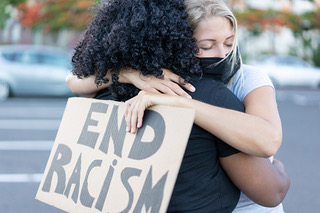Both sensuality and profanity dwell within love’s truthful self-expression. James Baldwin’s oeuvre reads race relations in the United States, revealing a skewed balance between sensuality and profanity rectified through authentic sensual connections across racial lines. This essay introduces Baldwin’s work as an exemplar of world reading, an ingredient of cultural literacy, to argue that sensuality prevents society from dismissing negative emotions as merely symptomatic of race or class resentment. Centering on profanity, the argument relies on how Baldwin deftly constructs sensuality as an inversive emotional balm for healing the US race problem through the feminine energeia found in his pervasive testicular discourse.
Articles by Lorise A. Diamond
Lorise “Rise” Diamond is a PhD candidate in Cultural Studies at Claremont Graduate University and a California Pre-Doctoral Fellow specializing in critical pedagogy, Black and transnational feminism, queer humanism, and embodied cultural literacies. She holds an MA in Rhetoric and Writing Studies and a BA in Communication, with minors in Sociology and Honors Interdisciplinary Studies from San Diego State University, along with an associate degree in Communication from Southwestern College. A cultural cartographer, chalk-fingered visionary, and fire-breathing rhetorician, Rise maps margins, rewrites syllabi, and queers literacies at ecological intersections, advancing frameworks for racial reckoning and human connection. Her scholarship has been featured at the American Studies Association, National Women’s Studies Association, and Rhetoric Society of America. Rise founded the Linguistic Communication Development Center to champion equitable digital literacy, chairs CGU’s Center for Writing and Rhetoric Antidiscrimination Committee, and serves on the San Diego LGBTQ+ Survivor Task Force. Her publications include “Implicitly Biased Diversity: An Ideological Aporia in Digital White Space” (ProPublica) and a book review in Women’s Studies—An Interdisciplinary Journal. Internationally engaged, she was selected to speak at the United Nations' 64th Commission on the Status of Women and pursues global partnerships in South Africa, Canada, Costa Rica, and the Dominican Republic.
